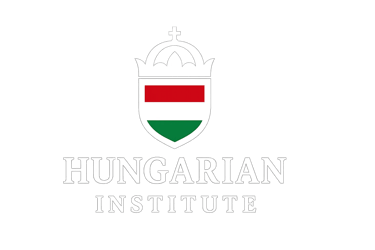Madal Café – Budapest and Beyond
A pioneering specialty coffee brand where bean, barista craft, and mindful hospitality converge in Hungarian caffeine artistry
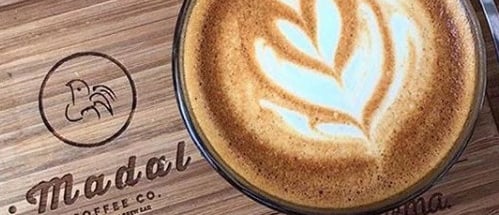

The Origins of Budapest’s Specialty Coffee Vanguard
Madal Café began in 2013 as the first dedicated filter coffee café in Budapest, a visionary concept pioneered by barista and coffee roaster Áron Horváth, who introduced Hungarian audiences to third-wave coffee, single origin beans, hand brew craftsmanship, ethical sourcing, and educational hospitality. His original outlet—an 11-seat café hidden in a courtyard off Ferenciek Square—quietly changed local perceptions of coffee. No longer was espresso the primary expectation; instead, daily customers queued for the pour-over method. Madal’s Delhi café interiors stayed small but precise: a long wooden bar, a handful of seats, and a lush vertical garden. Each day’s batch was ground fresh, each bean roasted locally in Pest. The atmosphere was hushed but purposeful: focused on letting the coffee speak through method, water quality, and bean provenance. As the chain expanded to multiple Budapest locations and suburban branches, Madal retained its founding ethos: origin transparency, brew precision, bean education, light roast clarity, and sustainable practice. It firmly positioned itself as the café that elevated Budapest’s coffee discourse, teaching customers not only to drink, but to taste, compare, and appreciate.
Coffee Philosophy: Coffee Origin, Brewing Ritual, and Local Roasting
At its core, Madal Café remains committed to single origin beans, light roast profiles, brew-method variety, transparent traceability, and micro-lot partnership. Their roastery sources from renowned farms in Ethiopia, Colombia, Guatemala, Kenya, and India, each with documented practices and small-lot workflows. Each café location features a Pour-Over menu (V60, Aeropress, Kalita Wave) that allows comparison of brewing methods. Espresso drinks appear with flat whites and cortados made using local bean blends roasted to maintain acidity while offering tactile crema. Water is filtered carefully, cups are pre-heated, and grinders calibrated daily. Baristas are trained to explain origin notes such as blueberry, floral jasmine, cocoa nib, or honey-like sweetness. Customers can purchase roast-at-demand beans, drip filters, and even espresso gear supplied by the roastery. Every brew is presented with a tasting card detailing harvest region, variety, altitude, processing method, and roast date. This level of commitment to bean identity, taste clarity, brewing consistency, tactile espresso, and customer education made Madal a local institution respected by coffee professionals and informed amateurs alike.
Sustainability, Education, and Ethical Sourcing
From its earliest days, Madal emphasized ethical sourcing and sustainability. It partnered with Global Specialty Coffee Alliance–certified farms, hosted fundraising events for farmers, and committed to compostable drip filters and retail bean packaging made from recyclable materials. It co-launched barista training programs that encouraged participants to visit origin farms, supporting understanding of producer challenges. Madal’s cafés offer free filtered water to reduce plastic cup use; they promote cup-sharing discounts for customers bringing their own mugs. Their educational newsletters, community tastings, and public cuppings inform customers on flavonoids, brew variables, and roast profiles. This constant educational outreach framed coffee not as commodity but as knowledge domain. Through workshops in universities, pop-up coffee lectures, and subscription coffee delivery, Madal embedded itself within the frameworks of ethical practice and responsible hospitality. The model underlines that every cup was not just beverage but a statement about sustainability, community engagement, scientific tasting, origin advocacy, and cultural enrichment.
Visual & Digital Presence: Clean Aesthetic, Persistent Voice
Madal’s digital identity mirrors its café aesthetic: minimalist design, high-resolution imagery of beans or v60 brewing, crisp typography, and subdued color palette. Their website features purchase of freshly roasted beans, brewing gear, and information about each café location. They communicate through newsletters that share origin stories, roast profiles, and cupping announcements—maintaining the same calm, refined tone found in their physical spaces. Instagram posts often highlight bean shipments, latte art, and interior details like terrazzo counters or courtyard greenery. Despite social traction, they avoid gimmicks—no flashy promotions, just constant delivery of taste integrity. Their email newsletters alternate roast announcements with tutorials or barista quotes; their tone is educational and understated. They have cultivated a loyal following of coffee aficionados who regard Madal not just as café, but as trusted resource. This digital presence reflects the principles upon which the brand was built: clarity, craftsmanship, transparency, and shared coffee literacy.
Practical Information
Madal Café has multiple locations in Budapest, including on Ferenciek Square, Baross utca, Arany János utca, and the Szeged airport station. Most cafés open between 8:00 AM and 8:00 PM, Monday through Saturday, with reduced hours on Sundays. Prices range from approximately 500 to 1,000 HUF for espresso-based drinks and 700–1,200 HUF for single-origin filter brews. Bean packages (200g) cost between 2,400 and 3,400 HUF, depending on origin. The cafés take card and cash payments, offer free Wi-Fi, and allow takeaway orders. They provide equipment rental or retail for home brewing gear. Wheelchair access is available at certain locations, though not all entrances accommodate strollers easily. Each café location offers limited seating—intended for focused coffee consumption rather than extended dining. The cafés are busiest mid-morning and late afternoon; early morning and early evening are quieter. No outside food is accepted. Public transit connections (metro line 3, trams, buses) serve all central outlets. They do not serve full meals but offer pastries, croissants, and light snacks. They encourage lingering but request that peak customers vacate their seats after one to two cups. The cafés are pet-friendly, with water bowls available.
Official Links
For coffee orders, location details, brewing education, and bean subscriptions, visit:
https://madalcoffee.com/
Follow their visual stories, origin insights, and coffee announcements:
Instagram: @madalcoffee
Facebook: Madal Café – Specialty Coffee
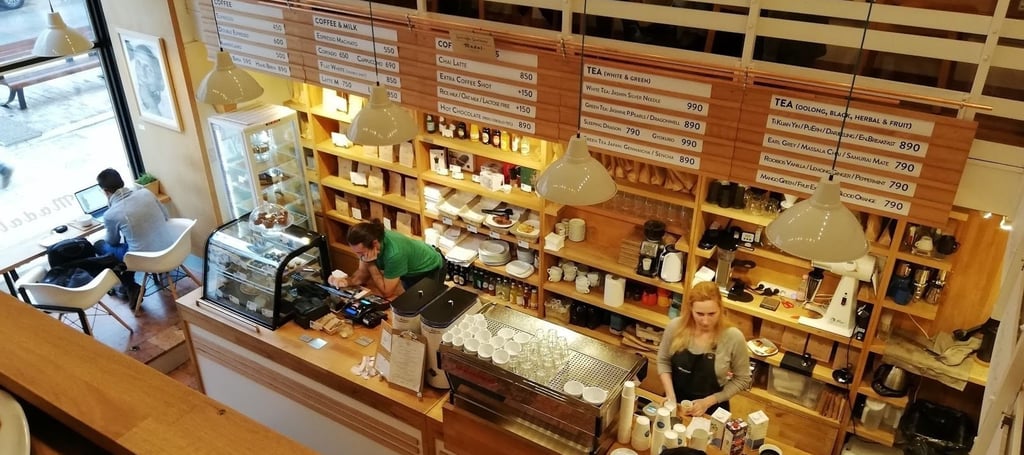

Spaces, Design, and Café Vibe
Each Madal location showcases minimalist design with a local accent: exposed brick, concrete benching, white tile walls, and greenery in corners keep the aesthetic clean but welcoming. Signature furniture includes oak communal tables and standing rails for laptop work. Natural light floods the front tables, while darker rear corners support reading or conversation. The Grindroasters roastery space in District XIII includes coffee classes and cupping tables next to the roasting machines. Despite its modest size, each café feels spacious thanks to high ceilings and uncluttered design. In summer, outdoor seating overlooks leafy side streets—creating a calm, neighborhood vibe. Locations vary slightly: one may offer a espresso bar, tablet-based ordering, or more cake variety, but the atmosphere is consistently focused and inviting. Even in tourist-heavy locations near the Basilica or Dunakorzó, Madal retains a steady cadence—lines move, coffee flows, the mood is quiet but purposeful. There is always a place to pause with a small financial transaction: one’s table, signature brew, and concentration.
The Daily Ritual: Madal’s Pietistic Approach
A day at Madal Café typically begins early with local guerrilla marketers turning circular. Regular customers arrive within minutes of opening for daily filter brew. The espresso machine—usually a Victoria Arduino Eagle or Synesso—hums in rhythm as baristas calibrate grind size and taste the ratio. Then comes a steady stream of to-go cups for office crowds on the move. By midday, the café serves a line intermittently: one customer sampling a single origin El Salvador Aeropress, another choosing a cortado for digestive calm. Mid-afternoon, the roastery may host a cupping session—cordial, guided tasting comparing new harvest beans. Late afternoon spills into light chatter and notebook tapping. Each location fosters a punctual but relaxed ritual: coffee orders aligned with personal habit, while conversations about bean origin, processing method, or crisp acidity emerge naturally. This rhythm sustained Madal’s rise not by theatrics but through a quiet insistence on consistency. It is a café experienced through multi-sensory ritual: aroma, taste, texture, lettered knowledge, and spatial continuity.
Cultural Impact on Hungary’s Coffee Scene
Madal’s emergence reshaped not only what locals drank, but how they conceptualized coffee. Where previously filter methods were niche, Madal made filter mainstream. They supported the founding of Budapest Coffee Week, taught workshops in hospitality schools, and participated in global barista competitions. Barista bi-annual tastings became public spectacles via Madal’s hospitality. The cafés also inspired a wave of professionals—many trained at Madal—to open their own outlets, leading to a second wave of Budapest specialty coffee shops such as Kontakt, Drop Coffee, and Fruccola. Press coverage frequently credits Madal with being a touchstone; travel and lifestyle magazines regularly reference its influence. Madal’s reportage highlights their collaboration with charity roasters, participation in sustainability forums, and support for rural development tied to coffee farming. The café’s ripple effect is tangible in roaster technology, brewing education, workplace design, and café culture. Their public seminars demystified coffee science and built consumer taste direction, enabling Hungary to take a seat in European coffee consciousness.
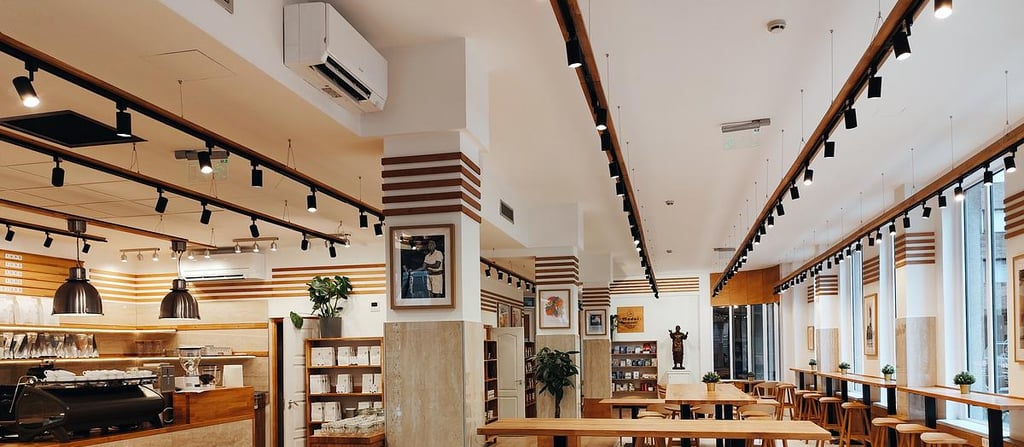

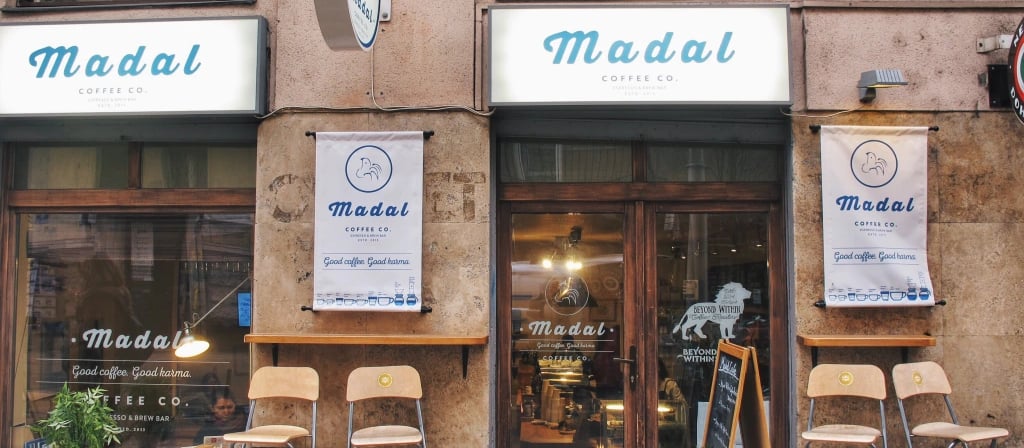

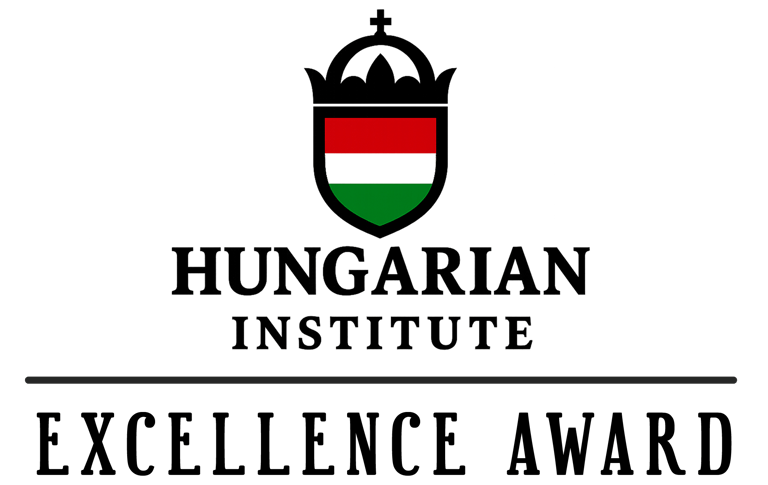

Awarded with the Grand Distinction
Madal Café received the Excellence Award for its role as a true pioneer in craft coffee, educational hospitality, ethical sourcing, and café design innovation in Hungary. Worth the visit not only for exceptional brews but for its rich blend of knowledge, flavor, and calm minimalism—a gathering place where each cup is part of a broader narrative in taste, community, and global coffee culture.
